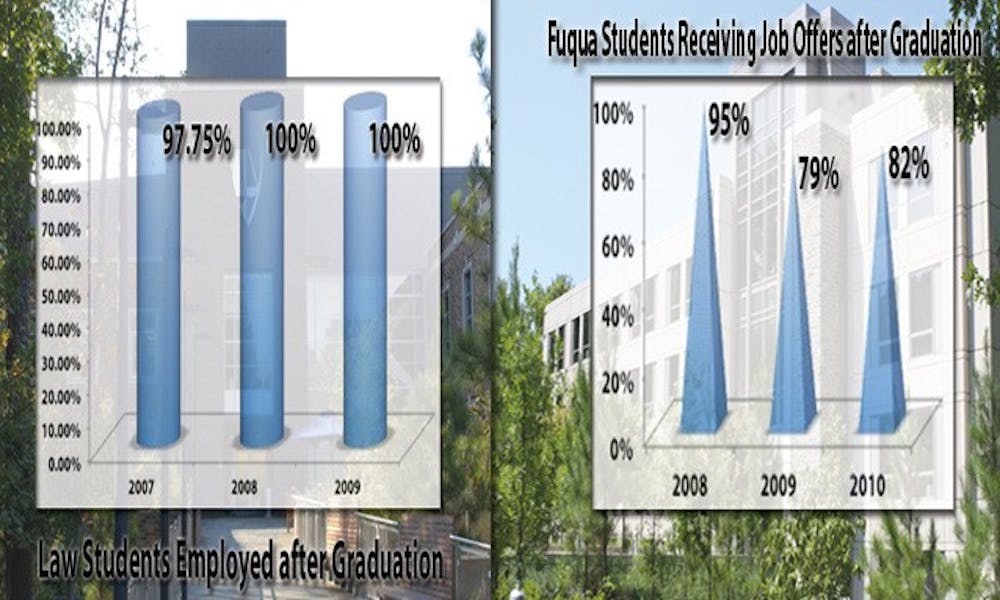As the economy begins to recover, students from the Fuqua School of Business and the School of Law are increasingly finding employment worldwide.
This year, 82 percent of full-time MBA students received job offers by Aug. 10, and 100 percent of Duke Law’s Class of 2009 was employed 90 days after graduation.
Fuqua’s employment rate this year is a 3 percent increase from last academic year. The growth comes after a sharp 16 percent drop in job offers in 2008-2009 from 2007-2008, when 95 percent of graduates had received offers by Aug. 10, 2008.
“It’s recognition of the unique position that Duke has in the educational world and the community,” said Sheryle Dirks, assistant director of career services at Fuqua, referring to the high demand for Duke graduates.
Dirks said Fuqua students often accept job offers that do not follow the typical time-frame for entry-level employment.
“[Smaller companies] recruit differently than [McKinsey and Company] or Johnson & Johnson who hire nine months in advance,” Dirks said. “They hire when the need emerges or when they have a position to sell.”
The employment opportunities for Fuqua graduates are countless and diverse, Dirks said. Though numerous graduates enter common fields such as investment banking, consulting or brand management, many follow more unprecedented paths, including small-business ventures, non-profit organizations and early-stage start-up companies.
Dirks emphasized the key role of alumni networking for Fuqua graduates. This September, more than 65 alumni returned to Durham to assist first-year students in the career-building process. Alumni from companies like Johnson & Johnson, Kraft and Delloite Consulting consistently return to recruit Fuqua graduates each year, she said.
“The quality of the students we admit helps to attract faculty members who attract a higher quality and diversity of employers, which makes happy alumni who come back and recruit more students,” Dirks noted. “It’s a virtuous cycle.”
The law school has also seen high employment rates—in the past five years, 98 percent or more of graduates have been employed nine months after graduation. For the second year in a row, 100 percent of law school students in the Class of 2009 were employed at graduation—a figure that has steadily risen in the past five years. Duke Law has seen a 100 percent employment rate at graduation since the implementation of its Bridge to Practice program in 2008, which awards students financial fellowships for eight to 12 weeks of full-time work.
But Mike Evers, Law ’90 and president of Evers Legal Search, said this statistic includes internships and public service jobs, which puts the number of professional positions much lower.
“There’s a lot of pressure on deans to have a high employment percentage,” Evers said, commenting on the decline in availability of entry-level legal positions. “Excluding [internships], most top-ranked law schools are looking at a 75-to-80 figure.”
In 2009, 70.3 percent of Duke law graduates joined a private law firm, according to the School’s website. The remaining students took clerkships, public sector jobs and other positions in areas like business or academia.
Bruce Elvin, associate dean of the School of Law, said students are heavily recruited by prestigious firms year-round.
“The majority of students take internships while at Duke and after having worked, in essence, for four or five months, can speak like real lawyers,” said Elvin, who is also director of the Career and Professional Development Center. “The whole institution is helping students build their human capital, which is essential in building their careers.”
Evers said Duke students are typically drawn to “gem jobs” in top law firms, likely due to the kind of professional training they receive on campus.
“The stereotypical Duke Law student is very private sector-oriented, and that’s not a bad thing,” Evers noted, adding that students from other schools like Yale Law School often find careers in politics or academia.
Like the Fuqua Career Center’s alumni program, the Law School’s Career and Professional Development Center invites alumni to help students in their career search. Evers said if a law firm already has a Duke alumnus, it is more willing to recruit at the University.
“The alumni network does not come across as vibrant, but we are more family-oriented and responsive because it’s a smaller club,” Evers said.
Get The Chronicle straight to your inbox
Signup for our weekly newsletter. Cancel at any time.

